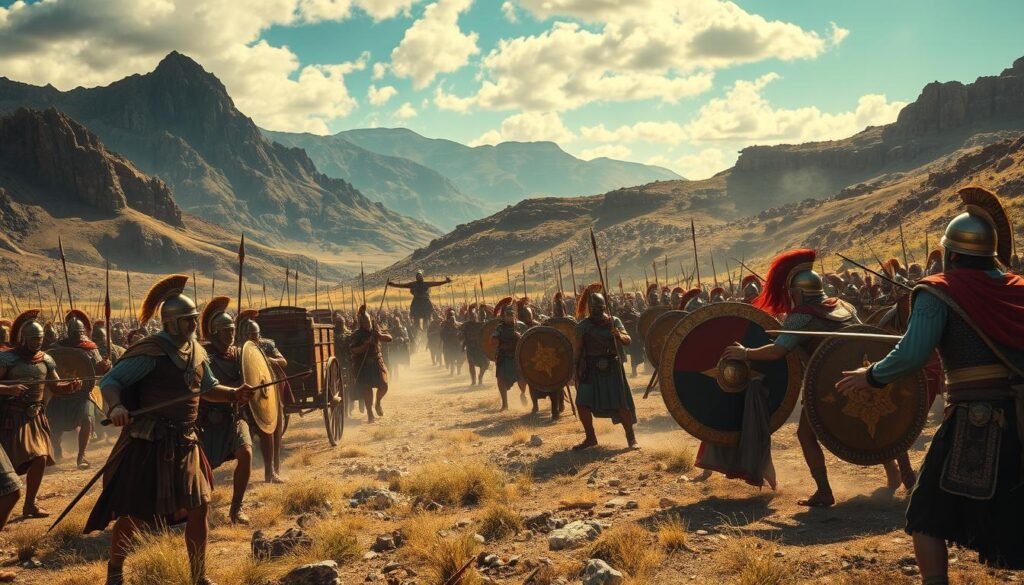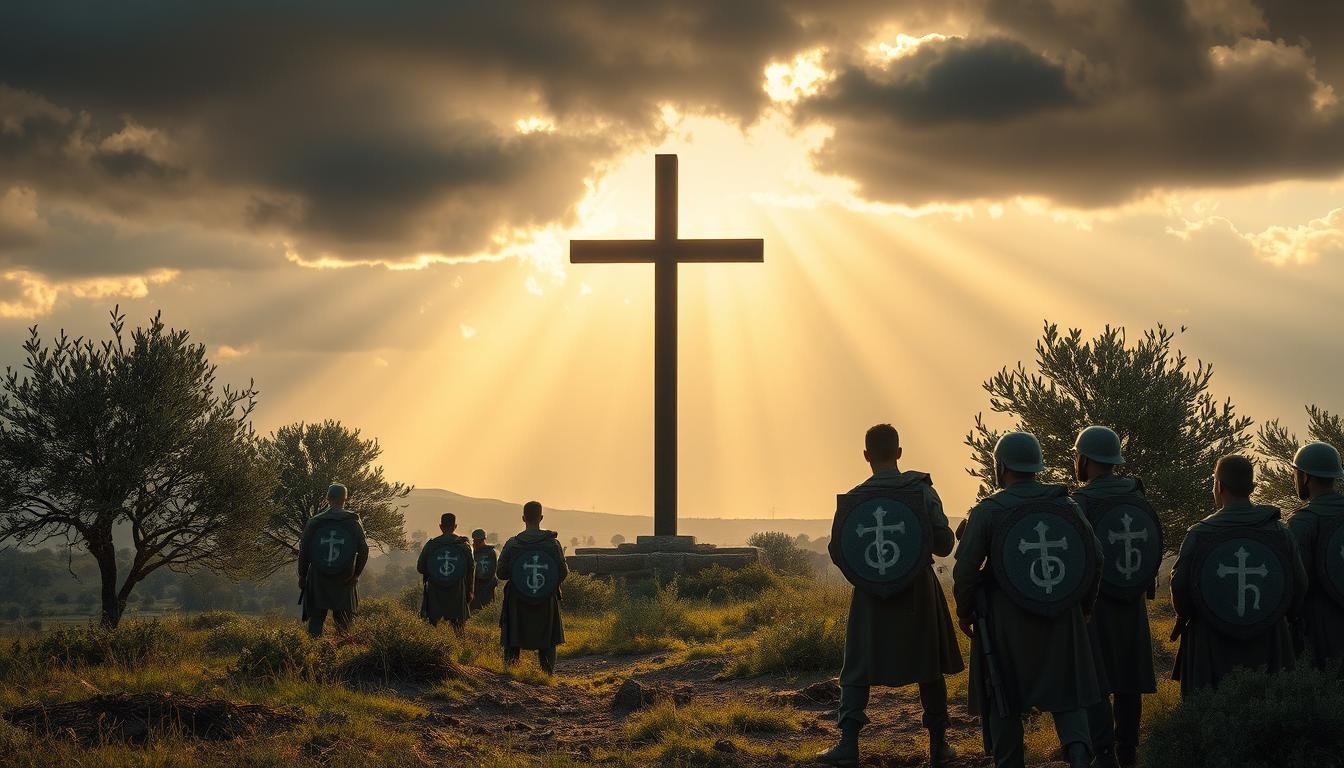Can Jesus’ teachings and war go together? This question makes many Christians think deeply. The Crusades and other wars show a mix of Christian war ethics and love. It’s hard to mix war with Jesus’ words to “love your enemies.”
This makes us wonder about Christian pacifism and military service. Is it okay for Christians to fight?
Christian groups have different views on war. We need to look at the Bible and history. This helps us understand how faith and war mix.
Let’s explore the Bible, the Just War Theory, and today’s views. We’ll see how faith and military service connect.
The Historical Context of Christians in War
Historical wars show a complex tie between Christians and fighting. From the Crusades to World Wars, Christians have debated war’s role in their faith. They question if fighting is okay, given teachings on peace and love.
Most Christians have seen war as sometimes okay, especially since Augustine. The Battle of Agincourt in 1415 killed about 10,000 French soldiers. This shows the harsh side of war.
The early church mostly followed Jesus’s example of nonviolence. The Just War theory came later, blending Christian and non-Christian ideas. The idea of Holy War started in the 11th century, showing a big change in views on war.
Today, Christians still have different views on war, based on where they are and what they believe. Thinking deeply about these past actions helps us understand how Christians deal with military service.
The Sixth Commandment and Its Interpretations
The Sixth Commandment, “You shall not kill,” is key in talks about war’s morality. It makes us think deeply about moral implications of killing. Scholars debate if it bans all killing or just murder.
The original Hebrew word “ratsakh” means unlawful killing. This makes us question the Sixth Commandment more. The Old Testament shows God ordering the killing of certain groups. This adds to the debate on the Sixth Commandment’s meaning today.
In Genesis 9, the death penalty for murder shows not all killings are the same. The Apostle Paul says in Romans 13:4 that authorities are God’s tools for justice. This supports the idea of just wars, as seen in the Westminster Confession of Faith.
The moral implications of killing go beyond simple definitions. They touch on the hard choices people make in war. St. Augustine believed in fighting for justice, but always with love and peace in mind. This makes soldiers think deeply about their actions, following the command to love others as themselves, as Matthew 22:37-39 says.
Despite the complexity, some Christians feel guilty about fighting in wars, like Vietnam. They struggle to match their beliefs with what society expects. This leads to deep thoughts on loving others and the harsh realities of war. The many views on the Sixth Commandment show its importance in talking about morality and war in a Christian context.
Can Christians Go To War?
Many Christians wonder if they can go to war. This question makes us think deeply about what the Bible says and our duties to society. Wars like the Crusades, the Holocaust, and the Inquisitions have sparked big debates. They show how bad things can get when religion leads to violence.
The Bible talks about war in a complex way. It shows the struggle between wanting peace and needing justice. Christians often face tough choices in war. They must decide between loving everyone and facing the hard truth of fighting.
Authors like Dr. Peter Kreeft and Dr. J. Daryl Charles help us understand these issues. They encourage believers to think deeply about joining the military. They want us to see the big picture and think about our actions.
Christians must figure out how to follow their faith in today’s world. They need to balance their beliefs with the lessons of history and current problems. This thinking helps them decide how to live out their faith and handle military service.
Old Testament Perspectives on Warfare
The Old Testament shows a complex view of war. It mixes God’s commands with the Israelites’ military actions. We need to look at God’s battle rules and why they fought.
Divine Commands and Warfare in Israel
In the Old Testament, God’s rules guided Israel’s wars. These rules made war a way to punish the Canaanites and others for their sins. Deuteronomy gives rules for war, like trying peace first and being careful.
God’s approval was seen in Israel’s war wins. Joshua’s conquest of Canaan is a key example of following God’s orders.
Justification of War from Old Testament Events
The Bible shows wars that were seen as right. Events like the fall of Jericho show war’s mix of land gain and divine purpose. Though not all cities were destroyed, some were, showing a reason for war.
These stories make us think about war today. They ask us to think about violence and justice in our own time.

New Testament Teachings on Conflict and Violence
The New Testament shows a new view on conflict and violence. Jesus and Paul’s teachings help us understand how to handle these issues today.
Jesus’ Teachings on Nonviolence
Jesus taught us to love our enemies. He didn’t say we should go to war. Instead, he talked about the end times in Mark 13:7, Matthew 24:6, and Luke 21:9.
His stories, like the one about a warring king, teach us wisdom and responsibility. When Jesus mentioned swords in Matthew 10:34, it was a symbol of division, not violence.
He also talked to soldiers, like John the Baptist did in Luke 3:14. This was about being ethical, not supporting war. The story of the Roman Centurion in Matthew 8:10 shows faith, not military support.
Paul’s Distinction Between Individual Believers and the State
Paul made it clear that individuals and governments have different roles. He said believers should strive for peace, even if the state uses force. Early Christians, like soldiers in Acts, showed faith in their jobs, not against them.
The New Testament teaches us about nonviolence. It challenges us to balance our personal beliefs with our duties in society, especially during war.
The Just War Theory and Christian Ethics
The Just War Theory is key in Christian talks about war. It tries to balance ethics with the hard facts of war. It comes from thinkers like Augustine and Thomas Aquinas.
This theory says a war must meet five main rules to be just. If a war doesn’t meet these rules, it’s seen as unjust and wrong.
Key Figures Advocating Just War
Many important thinkers have supported the Just War Theory. They say violence should be a last choice. Augustine started this idea, saying war should only happen after all peaceful ways have failed.
Thomas Aquinas built on this, saying there should be clear rules for war’s morality. Their work helps Christians understand war’s moral sides.
Principles of Just War According to Christian Theology
The Just War Theory has many key rules. These rules help Christians decide if war is right. The main rules are just cause, legitimate authority, and proportionality.
Another big rule is using moral means. This means using the right amount of force. It aims to avoid too much violence and harm to civilians. The Just War Theory shows a way for Christians to think deeply about war’s moral sides.

The Case for Nonresistance and Pacifism
Christian nonresistance and pacifism challenge old reasons for war. They are based on Jesus’ teachings in the Sermon on the Mount. He taught love and peace, not fighting.
Many groups have shown the power of pacifism in Christianity. The American Peace Society started in 1816 to promote peace. The London Peace Society did the same in 1816, aiming for world peace.
Leo Tolstoy and Gandhi were big names in pacifism. Gandhi inspired Martin Luther King Jr. to fight for peace. This shows pacifism’s power to change the world.
Even today, many Christians follow pacifism. Conservative Anabaptist churches teach against war. Mennonites, for example, have stood against war for a long time.
There’s always a debate on nonresistance and pacifism. At the American Academy of Religion, people argue about war. This shows the importance of thinking deeply about war and peace in Christianity.
Contemporary Christian Engagement in Military Conflicts
Christian leaders have a big role in talking about war and ethics today. Many Christians have fought in wars like World Wars I and II. Now, people from different Christian groups serve in the military, asking big questions about right and wrong in war.
As war tech gets better, Christian views get more varied. They reflect what people talk about in society.
Views from Prominent Christian Leaders
Christian leaders have different views on war and ethics. Some say Jesus taught us to love and not fight. They follow Jesus’ teachings and believe in peace.
Others support the just war theory. They say war can be okay if it’s for a good reason and done right. This leads to a big talk among Christians about war.
Christian Responses to Modern Warfare Challenges
Christians have many ways to deal with war today. Some work for peace and think about the rightness of war. They believe in forgiveness for killing in self-defense.
Many see war as spiritual battle. They prefer praying and peaceful actions over fighting. This shows a big challenge for Christians to balance faith and the world’s harshness.
FAQ
Can Christians participate in warfare despite Jesus’ teachings on peace?
Christians have different views on war. Some think military service is okay. Others believe in nonviolence because of Jesus’ teachings.
What historical conflicts did Christians engage in, and how does this relate to their faith?
Christians have been in many wars, like the Crusades and World Wars. Their actions show the struggle between faith and state. It makes us think about war’s morality.
How does the Sixth Commandment influence debates on killing and warfare?
The Sixth Commandment, “You shall not kill,” is key in war debates. Some say it bans all killing. Others think it only means murder. This makes it hard to decide on war actions.
What does the Old Testament say about warfare and divine commands?
The Old Testament talks about war as God’s will. Stories of David and Joshua show war as obedience. Today, Christians must think about these stories and modern ethics.
How do New Testament teachings differ regarding conflict and violence?
The New Testament says Jesus taught love and nonviolence. This is different from the Old Testament. Paul talks about government’s role in justice, making the discussion complex.
What is Just War Theory, and who are its key advocates?
Just War Theory has rules for war, like just cause and authority. Augustine and Thomas Aquinas helped shape it. It helps Christians think about war and faith.
What arguments exist for nonresistance and pacifism in Christian thought?
Nonresistance and pacifism come from Jesus and the early church. They believe in peace and love. This challenges war and makes us think about a peaceful life.
How do contemporary Christian leaders approach military engagement?
Today, Christian leaders have different views on war. They consider history, the Bible, and ethics. New war technologies make the discussion even more complex.

Rockin’ the faith, one verse at a time!
Growing up, the Bible’s stories deeply impacted me. Now, with over 15 years of preaching experience, I blend timeless teachings with modern technology, making them relevant for today’s world.
Bible Hub Verse is my platform to share historical insights and thought-provoking articles, exploring both familiar and uncommon Christian topics. My passion is building a welcoming online space for everyone to learn, grow in their faith, and discover the Bible’s enduring message.
Join the journey!
God bless you.









